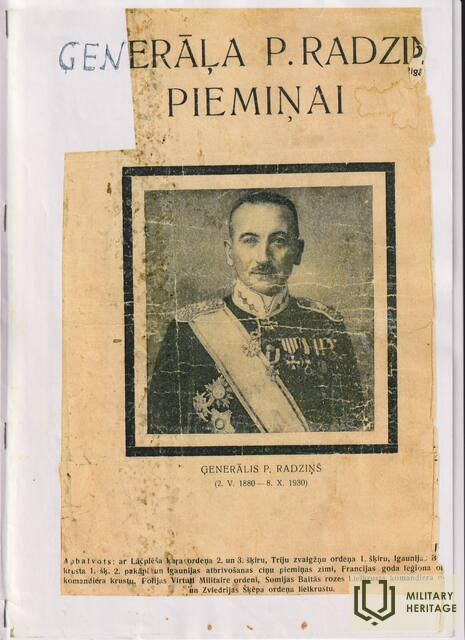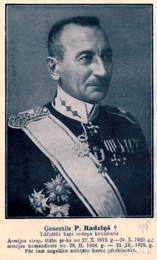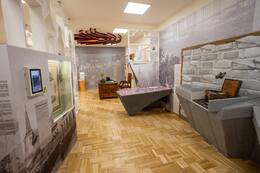In memory of Pēteris Radziņš, general of the Latvian Army, two-time Cavalier of the Lāčplēsis War Order
General Pēteris Radziņš was born in Lugaži parish, Valka district, into a simple farmer's family, where he learned to do field work. He was a very smart young man, after graduating from school he decided in favor of war and thus began his army career, saving Latvia from Bermont's troops. P. Radziņš was one of the most outstanding officers of the Latvian army and was awarded numerous Latvian and foreign orders and commemorative signs.
Jānis Radziņš - Pēteris Radziņš's older brother, the last owner of the family home "Jaunvīndedži" : "As boys, we often measured our strength. Pēteris never gave up and tried to prove to his father that he was as strong as me. He studied excellently at school. Already at the Lugaži parish school, he had the desire to become an "officer". After graduating from the Valka district school, Pēteris did not give up his intention and prepared for the exams at the Pskov Military School through self-study. From morning to evening he worked, but on Sundays and at noon he studied books. The workers sometimes grumbled that an educated person was doing simple jobs. My brother used to answer: "I want to earn my bread by working, that's why I work.""
Jānis Radziņš, talking about his younger brother's relationships, says: "My brother died a bachelor, although he had several favorable opportunities in his life to get married. When I asked my brother about getting married, he always replied: "A soldier has nowhere to put his wife during the war.""
“Until recently, before his death, Peter lived with us for two weeks. He would not have returned to the city so soon if he had not learned from a accidentally received radio message that he urgently needed to appear before a military court as a witness. The general had misunderstood the summons in the court summons as to why the trip was unexpected. It visibly worried him. He did not want to leave his country homestead yet. But called by duty, he left his father’s house and relatives – forever.”
General Jānis Balodis - Pēteris Radziņš's colleague and friend : "On the evening of October 26, an energetic and intelligent-looking gentleman in simple, black private clothes arrived at the headquarters. He introduced himself at the headquarters - Colonel Radziņš. I had known Radziņš since ancient times, and it was also a coincidence! It was not the first time that we met in the great Russian army - Radziņi, Baloži, Ozoli, who looked each other up by their Latvian surnames. "Where are you from?" - "I'm from Valka." "But I'm from Trikate." That's how we, Valceni residents who met by chance, became friends."
“General Radziņš will go down in our history as a war leader – he has no less merit as the creator and trainer of the army. We must not forget that our national army brought together officers from different armies, with different education and traditions – all of them had to be fused into one coordinated Latvian officer corps. In this work, Radziņš’s excellent knowledge, which he supplemented with persistent dedication until his last hour, was of particular importance. It will live in our national soldier as long as our nation exists and this is his immortality, which he himself built and which no one can take from him.”
Lieutenant Colonel Aleksandrs Plesners : “In conversations, he never brags about his experiences and his personality. On the contrary, he only studies and observes others and what is happening. He is at peace with every job assigned to him, and the commander-in-chief has to convince him for a long time to take on the tasks of chief of staff. Not because he feels unprepared for them, but he knows that others have been working here for a long time, have become better known and, presumably, the trust of subordinates is greater. And indeed, curiously, at first not without prejudice, subordinates and others observe the new, unfamiliar chief of staff. His appearance, which was even less Apollonian than later, his thin, lanky and tightly coiled legs, and, above all, his handwriting, which resembles the scribbles of a native and at first full of Russian sentences, words and letters – all this at first seems to elicit a grin.”
“The smallest drops split even the hardest rock. And how many drops of pettiness, how much evil stupidity have been spilled against this big, lonely heart, making it wiser, more insensitive. “Radziņš is a politicizing general. Radziņš is organizing conspiracies, Radziņš has not carried out a coup only because he lacked courage. Radziņš has no place in the army,” - all this may have seemed funny to others, but for Radziņš himself it was still a painful insult. Doubted in his best beliefs and his brightest intentions, not seriously defended by anyone, he was forced to withdraw ever deeper into himself and his loneliness.
Colonel Teodors Andersons : “Pēteris Radziņš read a lot, not only military, but also philosophical articles. He was also interested in religious issues. It was pleasant to talk to him. We often discussed a wide variety of issues. By his nature, he was very sensitive and often took every little thing close to his heart, although he never showed it outwardly and seemed to be indifferent. Therefore, he often experienced disappointments. As a military specialist and connoisseur of army life, he is very highly regarded.”
“The deceased lived very quietly all this time and led a decent life. In the evenings we often sat together. He rarely went to parties and balls. He did not like to be friends with others, but always loved to be alone. He was an officer who gave his work and knowledge to the formation of our army. In society, where he rarely appeared, he was cheerful, sincere and responsive. He loved to laugh and joke. He was helpful to everyone who turned to him. In life, he often closed himself off, but where necessary – he was not afraid to express his thoughts openly, although this sometimes caused trouble and attacks. I know him as a great patriot.”
A close war comrade : “Strikingly withdrawn by nature, always coming to work, he did not seek society. But in his dealings with people, like a true European, he was always kind, smiling, and sparklingly witty. More open with his friends, yet reserved, never familiar. He never said a word that was unnecessary, neither at work nor in private conversations. If he disagreed, he usually suffered silently and smiled ironically, or briefly and clearly explained his opinion. His answers always hit the mark. Always poised and controlled, a man of firm character, he knew how to overcome his nervousness and did not make others nervous either.”
"We have never seen General Radzinas angry and agitated," his colleagues say in one voice. Sometimes he pretended to be stern when the service required it, but he never gave vent to his anger. He never raised his voice, which usually had the sharpness of steel."
Book – In memory of General Pēteris Radziņš
Related timeline
Related topics
Related objects
Memorial site of General Pēteris Radziņš
Located in Valka parish, driving along the Valka – Rūjiena (P22) road at kilometer 4, turn right, following the signs.
Pēteris Radziņš was born on May 2, 1880 in “Jaunvīndedzēs” of Lugaži parish. He studied at Lugaži parish school, Valka city school and Valka Nelsons real school. He joined the Russian army as a volunteer. In the autumn of 1919, he returned to Latvia and on October 27, he was appointed Chief of Staff of the Supreme Commander of the Army, assuming this position at the moment when the Bermontites threatened Riga. As Chief of Staff, he led all the battles in Riga, Zemgale and Latgale. On February 5, 1920, he was promoted to general.
Nowadays, a memorial stone dedicated to General Pēteris Radziņš (1880 - 1930) can be seen near the family home.
On November 11, 2017, a memorial plaque to Pēteris Radziņš was unveiled in Riga, at the corner of Daugava Gate.
Video: General P. Radziņš memorial event at the Riga Brothers' Cemetery in 2019
Video: On May 2, 2019, on the 139th birthday of General Pēteris Radziņš, a commemorative event was held on the 11th November embankment, near the Presidential Palace, with an honor guard and interested parties surrounding the memorial plaque.
The Valka Museum of Local Lore's exposition "Valka - the Cradle of Latvian Independence" also reflects the life and activities of General Pēteris Radziņš.
In addition to traditional methods of displaying the collection, the exhibition uses interactive multimedia solutions. Information and annotations are translated into Estonian and English.
Exhibition “Valka - the Cradle of Latvia’s Independence”
The Valka Local History Museum is located in Valka, on the right side of Rīgas street, in the historical building of the Vidzeme Parish School Teacher Training Seminary. From 1853 to 1890, the building was home to the Vidzeme Parish School Teacher Training Seminary. Until 1881, it was led by Jānis Cimze, a teacher and founder of Latvian choir culture. After the School Teacher Training Seminary was closed, the building served various educational, cultural and household needs for 80 years. The building has been home to the Valka Local History Museum since 1970. The museum’s permanent exhibit – ‘Valka, the Cradle of Latvia’s Independence’ – has been set up as a story about social and political events in Valka from 1914 to 1920 when Latvia became an independent state. The exhibit reflects the preparation leading up to the establishment of the Latvian state and the formation of the North Latvian Brigade in Valka. Through four senses, namely, the Road, the Council, the Headquarters and the Home, the exhibit focuses on topics related to the city of Valka, refugees, the founding of the Latvian Farmers’ Union (1917), the
Latvian Provisional National Council (1917), the Latvian Provisional National Theatre (1918), the Provisional Government of Soviet Latvia known as the Iskolat, the North Latvian Brigade (1919) and General Pēteris Radziņš. In addition to the traditional ways of showcasing collections, the exhibit makes use of interactive multimedia solutions.







